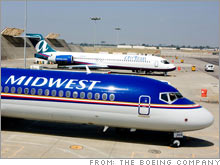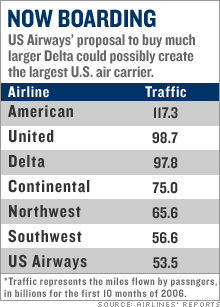Airline stocks: Hot sector, room to runRising fares and falling oil have lifted the sector. Now comes merger speculation. Is it too late to buy?NEW YORK (CNNMoney.com) -- Airline stocks have soared the past four months as strong fares and falling jet fuel prices have lifted the outlook for the troubled industry. Now the stocks are climbing even higher on widespread talk of a round of mergers. But is it too late for investors to get in?
|



